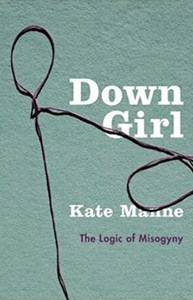Take a photo of a barcode or cover
challenging
emotional
informative
reflective
Manne has an incredible breadth of knowledge on both philosophy and feminism, and her work is one of the most important modern feminist texts I’ve read.
The most important point Manne make is in her definition of a misogynist, not as someone who hates women (as many are quick to rebut this) but as someone who contributes to upholding patriarchal standards that oppress women. She references examples ranging from mass murderers like Elliot Rodger to politicians like Hillary Clinton and Julia Gillard for a comprehensive overlook of different misogynist outlets. I appreciate that Manne was quick to reference fellow authors and friends whom she not only cited but was inspired by. I also appreciated Manne’s attention to intersectionality.
It took some work to comprehend some of the philosophical jargon and references Manne used, but it was entirely worth it. I look forward to reading her other works.
The most important point Manne make is in her definition of a misogynist, not as someone who hates women (as many are quick to rebut this) but as someone who contributes to upholding patriarchal standards that oppress women. She references examples ranging from mass murderers like Elliot Rodger to politicians like Hillary Clinton and Julia Gillard for a comprehensive overlook of different misogynist outlets. I appreciate that Manne was quick to reference fellow authors and friends whom she not only cited but was inspired by. I also appreciated Manne’s attention to intersectionality.
It took some work to comprehend some of the philosophical jargon and references Manne used, but it was entirely worth it. I look forward to reading her other works.
challenging
dark
informative
reflective
medium-paced
challenging
informative
slow-paced
challenging
dark
emotional
informative
reflective
medium-paced
finally a philosophy book that’s actually interesting!
informative
reflective
sad
slow-paced
emotional
informative
medium-paced
challenging
emotional
informative
reflective
medium-paced
reflective
slow-paced
4.5 stars
I waffled for a while on whether to give this a 4 or 5 on Goodreads because of my frustration with the philosophy jargon, which is dense.
But a week after I finished this, I stumbled across a use of the word "misogynist" according to the dictionary definition, and was instantly glad I had read this book. Manne's book is predicated on defining misogynist not as a "person who hates women" but rather a person who is policing female behaviors that go against patriarchal norms and step outside of what women are supposed to be doing. This is an important reframing, and I think it provides women with a key tool for recognizing this behavior when they face it.
This book has some really insightful analysis of our modern political context, and I would encourage people to read for that. However, Manne does not seem to have written this for a popular audience, and for those of us without a strong philosophy background, it will be a slog in some places. I wish this book and its nuanced, thoughtful comments were in slightly more accessible language for a broader audience, as I think a lot of people would find it helpful.
I waffled for a while on whether to give this a 4 or 5 on Goodreads because of my frustration with the philosophy jargon, which is dense.
But a week after I finished this, I stumbled across a use of the word "misogynist" according to the dictionary definition, and was instantly glad I had read this book. Manne's book is predicated on defining misogynist not as a "person who hates women" but rather a person who is policing female behaviors that go against patriarchal norms and step outside of what women are supposed to be doing. This is an important reframing, and I think it provides women with a key tool for recognizing this behavior when they face it.
This book has some really insightful analysis of our modern political context, and I would encourage people to read for that. However, Manne does not seem to have written this for a popular audience, and for those of us without a strong philosophy background, it will be a slog in some places. I wish this book and its nuanced, thoughtful comments were in slightly more accessible language for a broader audience, as I think a lot of people would find it helpful.



